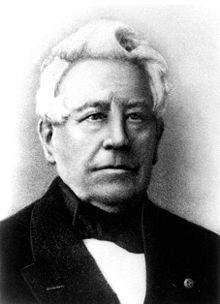Karl Zell
Adam Karl Philipp Zell (born April 8, 1793 in Mannheim , † January 21, 1873 in Freiburg im Breisgau ) was a German classical philologist , professor of archeology in Heidelberg and a politician from Baden.
Life
Training and professorship in Freiburg
Karl Zell was the son of the City Court Clerk Joseph Zell (* 1756; † 1798) and Antoinette Sartorius (* 1757; † 1847). He attended the Lyceum in Mannheim, whose headmaster was Friedrich August Nüßlin , a student of Friedrich August Wolf . Nüßlin advised his pupil to study Classical Philology at the University of Heidelberg . Here, after starting his studies in the winter semester 1810/1811, Zell became a pupil of August Boeckh and Friedrich Creuzer , who shaped him; Zell spent further semesters at the Universities of Breslau and Göttingen . From 1814 he worked as a teacher at the Lyceum in Rastatt. After completing his doctorate , Zell published the Nicomachean Ethics of Aristotle in two volumes (Heidelberg 1821).
Also in 1821, on May 17th, he was appointed to the professorship for philology at the University of Freiburg , which had been vacant seven years earlier since the death of Johann Georg Jacobi . In Freiburg, Zell redesigned the philological studies. In 1830, following the example of various other universities, he founded the Philological Seminary , the main purpose of which was to train teachers. For Anton Baumstark , who was employed at the seminar in 1830, Zell introduced a second chair for classical philology in 1836. In addition to the seminar leader, Zell held various positions at the university: he was dean of the philosophy faculty, member of the economic deputation, prorector and from 1829 senior librarian.
Political activity and professorship in Heidelberg
From 1831 to 1835, Zell was the university's representative in the Baden First Chamber , where he campaigned for the reorganization of Baden's higher education system from the start. It was successful: in 1836 a new curriculum was adopted for the higher schools and a higher authority (Oberstudienrat) “for the supervision and promotion of the taught lessons” was set up. Zell joined this senior student council as a ministerial councilor while he left the university and gave up his chair. Zell did not return to university teaching until ten years later, when he was appointed Professor of Archeology in Heidelberg for the summer semester of 1847 to succeed Friedrich Creuzer . In 1849 he was Dean of the Philosophical Faculty there, and in 1851 Vice Rector. He succeeded in organizing rooms for the archeology department in what was then the university library; only his successor Karl Bernhard Stark was able to found an independent archaeological institute in 1866 .
In addition to teaching, Zell continued to be an external member of the senior student council and was also a member of the Baden Second Chamber from 1848 to 1853. As a devout Catholic, he stood up in the state parliament as well as later in political meetings and as a publicist decisively for the freedom and independence of the Catholic Church. Thus he stood in the emerging Baden culture war on the side of the Archdiocese of Freiburg , which got into an increasing conflict with the state authorities of the Grand Duchy of Baden . In 1852, Zell was elected President of the Assemblies of Catholic Associations in Münster and confirmed in this position in Vienna in 1853. On March 13, 1855, he retired and moved to Freiburg, where he died in 1873.
Work and honors
In his scientific publications, Zell was particularly concerned with the philosophy of Aristotle , whose writings he commented on and edited. He also edited the Latin authors Horace , Phaedrus and Eutropius and wrote essays on modern European literature ( Calderon , Shakespeare ) and the history of Baden. Although he was the founding director of the Archaeological Institute of Heidelberg University, he did not write any publications in this area and was not satisfied with the title “Professor of Archeology” because he found it too restrictive in terms of subject matter.
In 1836 he was appointed Ministerialrat and in 1846 the Privy Councilor ; In 1838 he received the Knight's Cross from the Order of the Zähringer Lion . He also received an honorary doctorate from Heidelberg University.
Fonts
- as a translator: Organon or writings on logic. Stuttgart 1836. ( Greek prose writers in new translations, Vol. 154/155)
- The princely daughters of the House of Baden. Karlsruhe 1842.
- Handbook of Roman Epigraphy. 2 parts, Heidelberg 1850.
- Pictures from the present. Freiburg im Breisgau 1856.
literature
- Friedrich von Weech : Zell, Karl . In: Allgemeine Deutsche Biographie (ADB). Volume 45, Duncker & Humblot, Leipzig 1900, pp. 15-17.
- Franz Leopold Dammert: Karl Zell. In: Baden biographies. Second part, edited by Friedrich von Weech. Fr. Bassermann, Heidelberg 1875, pp. 534-537 ( digitized version ).
- Dagmar Düll: Heidelberger Gelehrtenlexikon 1803-1932. Springer, Berlin et al. 1986, ISBN 3-540-15856-1 , p. 309.
Web links
- Literature by Karl Zell in the catalog of the German National Library
Individual evidence
- ^ Roland Hampe : Archaeological Institute. In: Gerhard Hinz (Ed.): 575 years of Ruprecht-Karl University of Heidelberg. From the history of Heidelberg University and its faculties (= Ruperto Carola. Special volume). Brausdruck, Heidelberg 1961, pp. 315-318, here p. 315.
| personal data | |
|---|---|
| SURNAME | Zell, Karl |
| ALTERNATIVE NAMES | Zell, Adam Karl Philipp (full name) |
| BRIEF DESCRIPTION | German classical philologist |
| DATE OF BIRTH | April 8, 1793 |
| PLACE OF BIRTH | Mannheim |
| DATE OF DEATH | January 21, 1873 |
| Place of death | Freiburg in Breisgau |

